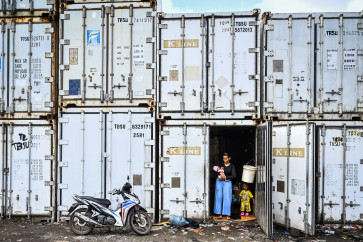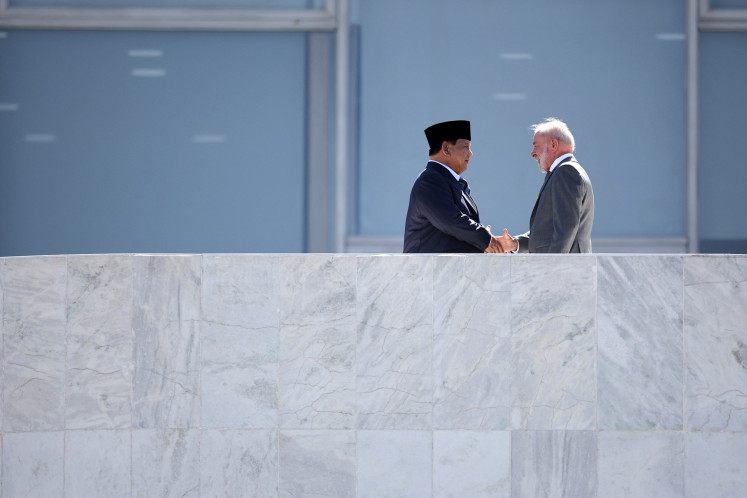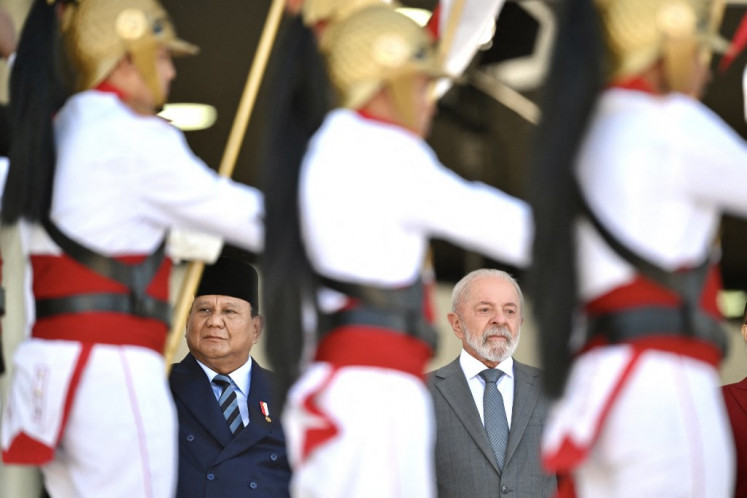Popular Reads
Top Results
Can't find what you're looking for?
View all search resultsPopular Reads
Top Results
Can't find what you're looking for?
View all search resultsCrime suspects running in elections
The residents of Buton, Southeast Sulawesi, are befuddled. Last week, Samsu Umar Abdul Samiun, the leader of the island regency, made headlines in national media. Not for good reasons, though. Samsu, who is running for reelection, was arrested by Corruption Eradication Commission (KPK) investigators last week after being named a suspect for alleged bribery in 2011.
Change text size
Gift Premium Articles
to Anyone
The residents of Buton, Southeast Sulawesi, are befuddled. Last week, Samsu Umar Abdul Samiun, the leader of the island regency, made headlines in national media. Not for good reasons, though. Samsu, who is running for reelection, was arrested by Corruption Eradication Commission (KPK) investigators last week after being named a suspect for alleged bribery in 2011.
What has also put the Buton people in limbo is the fact that the Samsu-La Bakry pairing is the only ticket running in the Feb. 15 election.
Will they let a graft suspect determine the future of the regency? On the other hand, if most of the voters tick the blank box on the ballot paper because they don’t want a graft suspect leading them, then the whole election process will be repeated, which could risk leaving the regency with no definite leader for months.
Indonesia is set to go through simultaneous regional elections on Feb. 15 in 101 provinces, cities and regencies. At least seven candidates, however, are suspects for various offenses, mostly corruption.
General Elections Commission (KPU) chairman Juri Ardiantoro said a suspect status could not prevent anyone from running in an election. The 2016 Region Elections Law states that a candidate loses his or her candidacy only if he or she is convicted in a legally-binding court ruling.
“Even if the candidates are detained, their names will still be listed on the ballots,” Juri said on Tuesday.
Elections Supervisory Agency (Bawaslu) commissioner Nelson Simanjuntak echoed Juri’s statement, saying that the country upholds the presumption of innocence principle.
A problematic candidate is also running in Cimahi, West Java. In December last year, incumbent mayor Atty Suharti was arrested by the KPK.
Graft allegations have also been leveled against the incumbent Takalar regent in South Sulawesi, Burhanuddin, and the incumbent Jepara regent in Central Java, Ahmad Marzuki, among others.
In Sarmi regency, Papua, local KPU members annulled the candidacy of incumbent regent Mesak Manibor in late December after the Supreme Court declared him guilty of corruption in a final and binding decision. Mesak was replaced by Berthus Kyew Kyew.
Other candidates who are implicated in other crimes include incumbent Jakarta governor and blasphemy defendant Basuki “Ahok” Tjahaja Purnama as well as incumbent Gorontalo governor and defamation defendant Rusli Habibie.
Well-known musician Ahmad Dhani, who is running for Bekasi deputy regent, was also named a treason suspect in December.
KPU commissioner Sigit Pamungkas said the 2016 law was “too lenient” as it “provided room even for defendants to run in elections.”
He said it was the responsibility of political parties to provide qualified and competent candidates.
He added that the KPU did not have the authority to reject a candidate based on their track record.
But Sigit said the KPU published information on candidates’ wealth and campaign funding.
Similarly, Association for Elections and Democracy (Perludem) head Titi Anggraeni said the upcoming elections would mark a milestone in Indonesia’s fledgling democracy, but it was a milestone marred by a series of problematic candidates.
“Political parties have failed to produce qualified candidates for the citizens of this country. The party mechanism does not work,” she said, adding that Perludem had also criticized the law that allowed former convicted criminals to compete in elections such as Abdullah Puteh, an Aceh gubernatorial candidate who is also a former graft convict.
“Civil societies and the media have a responsibility to help educate voters,” she said.
Of the seven candidates who are criminal suspects, five are backed by the country’s second biggest party, Golkar.
Golkar executive Yorrys Raweyai said the party nominated the candidates because they had a good chance of winning their races.
“We based our decisions on survey results alongside subjective and objective assessments,” he told The Jakarta Post.
-----
Jon Afrizal and Andi Hajramurni contributed to the story from Jambi and Makassar










